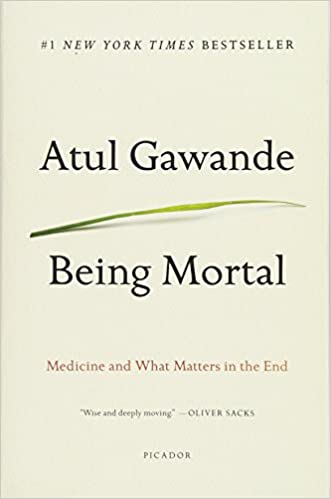Do phrases such as “Hang in there?” tick you off? Surely, there is something better to hear when you’re dealing with the loss of a loved one or if you’re facing your own mortality. Everyone knows that the one constant thing in life is death.
It’s guaranteed to happen to every single soul in the world. With no way around it, what are we supposed to do? We must not only accept the deaths of our loved ones but also contemplate our own.
Today, we’re sharing with you how to accept death as a part of life and be at peace with your mortality. Often, people who think and talk about death a lot are slapped with the label “death-obsessed” or “morbid.”
This unhealthy way of thinking leaves us completely unprepared, both for our own mortality and for the deaths of others. Here are some healthy ways to cope.

Being Mortal
by Atul Gawande
⏱ 14 minutes reading time
🎧 Audio version available
Get Your Paperwork in Order
The first step toward accepting death as an inevitable part of life and reaching peace with it is the most logical step—getting your paperwork in order. Death isn’t just grief; many legalities and logistics go with it. If you do not prepare, your loved ones will deal with the fallout and make some major decisions you might not particularly agree with.
Whether you’re young and healthy, old and sick, or somewhere in between, having your paperwork ready can not only leave you feeling at peace but also save everyone a headache and heartache. Let’s say you only have a short amount of time to live. Do you really want to spend that time drowning in paperwork and visiting lawyers?
Finish all the conversations that need to happen. Make the hard decisions about your medical care, funeral arrangements, and so on. Most importantly, decide who is going to be the person you trust to handle your affairs after you cannot do them yourself.
Don’t Wait to Achieve Your Goals
People often fear death because they feel like they haven’t accomplished enough. Unless you want to follow down an “unfinished business” storyline, then achieving your goals is the next step on your journey to accepting death.
You don’t need to be knocking on death’s door to get a head start on your bucket list. You may regret never telling that person you liked them, not spending enough time with your family, taking time off to hang out with friends, or enjoying that exotic vacation you always dreamed of. The limit to your bucket list is the date you die on, and who knows when that will be.
Resolve Your Conflicts
It’s never too late to make amends with those you carry old grudges for.
Take stock of your damaged relationships and identify which you wish to resolve. Chances are that this person is just as eager to make amends as you are. And you never know, this newly reignited friendship may be one of the most valuable relationships in your life.
Talk About Death at the Dinner Table
One way to get over the striking fear of the unknown is to make it as familiar as possible.
Many people will agree that death is a subject that no one really wants to talk about. Dinner tables are more likely to have shouting matches and political arguments than discussions of death, but this is unhealthy for everyone involved. It won’t make the topic go away, and refusing to talk about it increases the fear of it.
Throw a dinner party and talk about death on your own terms. Invite people who share the same type of curiosity and wish to converse about death. Here is some slightly uplifting news! This phenomenon of shushing everyone who wants to talk about death reduces with age.
In 2000, a meta-analysis found that the paralyzing fear of death initially grows in the first half of life, but by the time you reach the age group between 61 to 87, the fear becomes more manageable.
Cherish Every Moment
Embracing every moment means appreciating every experience as you live through them. There is nothing like thinking about the inevitability of death that makes us aware of how fleeting every second is.
When you’re feeling happy, even during moments when you’re sad, frustrated, or angry, try to cherish that moment before it goes away. This results in becoming more equipped to handle daily annoyances and irritations.
Now you can brush them off because you know it’s more important to enjoy the time you have left. This can also lead to feeling more fulfilled with your life. When you have lived a satisfying life, death may seem less intimidating.
Live How You Want to Be Remembered
Steve Jobs once said,
“Death is the destination we all share; no one has ever escaped it. Death is very likely the single best invention of life. It is life’s change agent. It clears out the old to make way for the new.”
But before death “clears out the old to make way for the new,” consider how you want to feel in those moments when your life flashes before your eyes. To avoid or minimize the amounts of regrets you cringe at, live life how you want to be remembered.
Whether that means being bolder in your approach to life, speaking the truth, smiling more, or donating often, go for it now before it’s too late.
Talk with Someone Who Is Intimate with Death
Talking with people who have had close encounters with death or have experienced the loss of their loved ones can be an invaluable resource on your journey to being at peace with your mortality. They can walk you through what it’s like to die or experience it firsthand.
They may provide valuable knowledge that you didn’t know about the process. Of course, no death is the same as another, and every person’s experience with it is universally unique, but it is comforting and helpful to hear another’s experience.
Work on Your Legacy
Another way you can be one step closer to accepting death and its cold embrace is to work on your legacy. By doing this, you can lessen feelings of hopelessness and limit that lack of purpose that forces you to dwell on the ugly, tragic side of it.
The perfect example of leaving behind a legacy is to look at what artists, inventors, and writers do. In his poem, “One Day I Wrote Her Name,” Edmund Spenser tries to write his beloved’s name in the sand. With each attempt, the waves come in and wipe the name. Eventually, after talking to his beloved, he realizes that the only way to immortalize her is through his words and his poem, which is still popular today.
By leaving behind a legacy, you can take comfort that you’re living on in some way and never really gone. Legacies don’t have to be paintings or books. It can be anything from raising a family to helping others. If anything, this will help you focus on accomplishing more, staying healthy, and not lamenting about mortality.
Learn More About It
Learning about death is one of the last steps in accepting it as a part of life. This doesn’t mean that you have to take courses on the topic. Studying death can include reading books about it and understanding the meaning of death in different cultures and beliefs.
You’ll find that this fear is global, but the more you learn about what to expect when the time comes, the more you’ll be comfortable with the process.
Use Mindfulness
A lot of mental and emotional heavy lifting will be done when coming to terms with death. Using mindfulness will help ease that headache.
While it’s obviously not healthy to constantly think about death, mindfulness can be a designated time where you comfortably sit with the morbid idea; therefore, the next time it pops into your head, the anxiety won’t be as paralyzing.
Sitting mindfully doesn’t mean that you are denying the fact that you’re going to die someday; rather, it acknowledges your feelings about it. This can calm you and make it easier to lead a fulfilled life.
What Is Snapreads?

With the Snapreads app, you get the key insights from the best nonfiction books in minutes, not hours or days. Our experts transform these books into quick, memorable, easy-to-understand insights you can read when you have the time or listen to them on the go.



